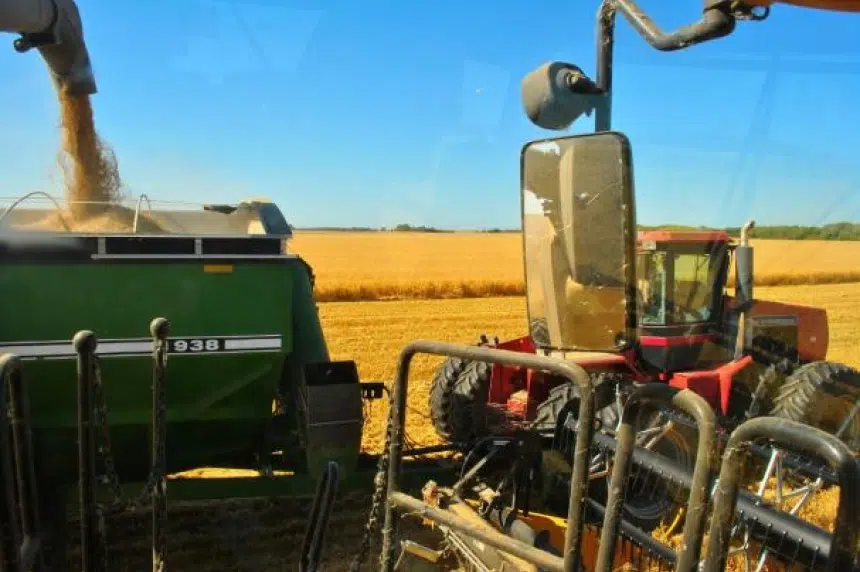The federal carbon tax will be sticking around and increasing every year, which has farmers worried about the extra costs.
The appeal against the tax from Saskatchewan, Alberta and Ontario was shot down in the Supreme Court on Canada on Thursday.
That means the plan to increase the price of carbon to $170 per tonne by 2030 will stay in place.
Todd Lewis, the president of the Agricultural Producers Association of Saskatchewan (APAS), heavily criticized the court’s decision.
“As producers, we don’t set the prices for our products and (we) can’t pass those extra costs along the value chain, so it comes right out of our pockets,” he said in a news release.
In a subsequent interview, he pointed out many operations on a farm heavily rely on fuel.
“It increases the cost of fuel, be it for things like transportation … So much of our product is moved by truck (and) truckers have to pay the increased carbon tax, which is passed on directly to farmers …,” Lewis said.
“Everything is moved by rail or truck, so both on our input and moving our product into market position, we pay huge amounts of carbon tax … At the end of the day, we have less money in our pockets.”
A study from APAS estimated a carbon tax cost of $2.38 per acre on the average grain farm. Lewis said that by 2030, that number would jump to about $12.50 per acre, specifically when growing wheat.
While wheat may be a convenient example, he said all producers are affected by the tax.
“With a livestock producer, it’s not unheard of that this winter, with the cold snap that we had … somebody trying to heat a barn has an extra cost of thousands of dollars per month …,” he said.
“When we have cold weather, which is the reality in a province Saskatchewan, we have to heat our barns and sometimes we have to dry our grain and there really are no alternatives. It makes it very difficult for producers to remain sustainable.”
Overall, Lewis believes the move to keep the carbon tax around is especially unfair to farmers and ranchers, since there’s nothing they can do to avoid it.
“Producers have managed their carbon very well,” he said. “We’re producing more and more bushels of grain, pounds of livestock, milk, eggs and everything else in agriculture with a lower and lower carbon footprint.
“We’re doing that and we’re part of the solution, not the problem, but with the current pricing model we’re really being punished for something we have no control over.”
Layne Abrahamson, a farmer in the Hanley area, agreed. He believes there are many challenges ahead because of the tax.
“It’s a really unfair decision. It has great consequences for us in the agricultural industry,” he said. “It’s going to be a really great financial burden for us. Unlike some industries, we can’t pass that cost along to the end user.
“Part of that is because of the competitive nature of the industries from other countries … Other nations don’t have the same cost for the agricultural industry, so we’re going to have to sell our products for the same cost and we’re going to have to eat the carbon tax and the GST on top of it.”
Environmental groups pleased with ruling
Environmentalists across Saskatchewan are applauding the carbon tax decision, hoping it will lead to a lower carbon footprint provincially and federally.
Jim Elliott — an environmentalist who has served in a wide range of positions for various organizations, many of them non-profits and advocacy groups — says the court’s decision does not come as a surprise.
“I think it reaffirms much of what was said in the appeal decision, the stance that climate change is real and that we’re impacting it,” Elliott said. “We need to be doing more to reduce our emissions.
“I’m optimistic that this will give some of us a sense that we can start making progress. I’m hoping we can begin to get moving on and start taking action, both in this province as well as across the country.”
Elliott is hopeful Regina could be fully renewable by 2050, a goal he believes is not just realistic but a job creator. He believes it would be a source of civic pride.
Larissa Shasko of Regina-based EnviroCollective had a similar sentiment toward the decision and what the future of energy looks like in the province.
“It is a very big step, but I think it’s really important right now that we have the different levels of government co-operating and collaborating to move forward,” she said. “I think (the court case) has been a really big waste of time, so it’s really important right now that we have political action and political co-operation.
“It doesn’t work for our province to oppose a policy that needs to be implemented on a national level in order to be effective.”
Shasko believes that many Saskatchewan residents will learn to respect the decision eventually, adding carbon pricing signals the need to kickstart our economy by harnessing the opportunities for renewable energy in the province.
“There’s so much opportunity in the renewable energy sector and other low-carbon energy options here in Saskatchewan. If we don’t transition our economy, we will simply be left behind,” she said. “Ultimately, the decisions that we’re making today, we’re depending on the younger generation to implement those decisions.
“We need to work together as a country.”
— With files from 980 CJME’s Logan Stein







